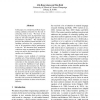Free Online Productivity Tools
i2Speak
i2Symbol
i2OCR
iTex2Img
iWeb2Print
iWeb2Shot
i2Type
iPdf2Split
iPdf2Merge
i2Bopomofo
i2Arabic
i2Style
i2Image
i2PDF
iLatex2Rtf
Sci2ools
92
Voted
EMNLP
2010
2010
Generating Confusion Sets for Context-Sensitive Error Correction
In this paper, we consider the problem of generating candidate corrections for the task of correcting errors in text. We focus on the task of correcting errors in preposition usage made by non-native English speakers, using discriminative classifiers. The standard approach to the problem assumes that the set of candidate corrections for a preposition consists of all preposition choices participating in the task. We determine likely preposition confusions using an annotated corpus of nonnative text and use this knowledge to produce smaller sets of candidates. We propose several methods of restricting candidate sets. These methods exclude candidate prepositions that are not observed as valid corrections in the annotated corpus and take into account the likelihood of each preposition confusion in the non-native text. We find that restricting candidates to those that are observed in the non-native data improves both the precision and the recall compared to the approach that views all prep...
Candidate Corrections | EMNLP 2010 | Natural Language Processing | Preposition | Preposition Confusion |
Related Content
| Added | 11 Feb 2011 |
| Updated | 11 Feb 2011 |
| Type | Journal |
| Year | 2010 |
| Where | EMNLP |
| Authors | Alla Rozovskaya, Dan Roth |
Comments (0)

